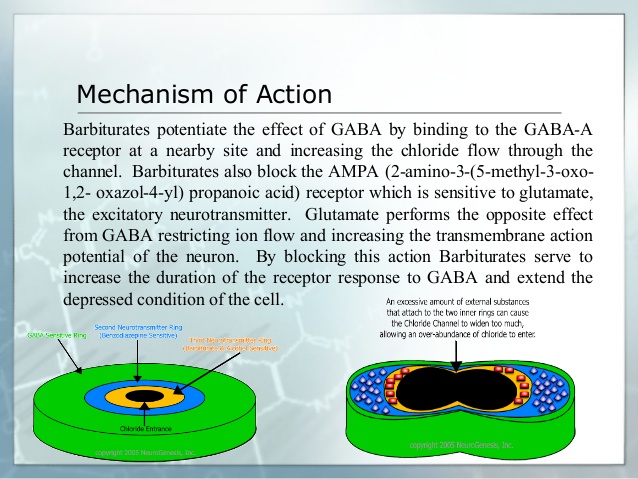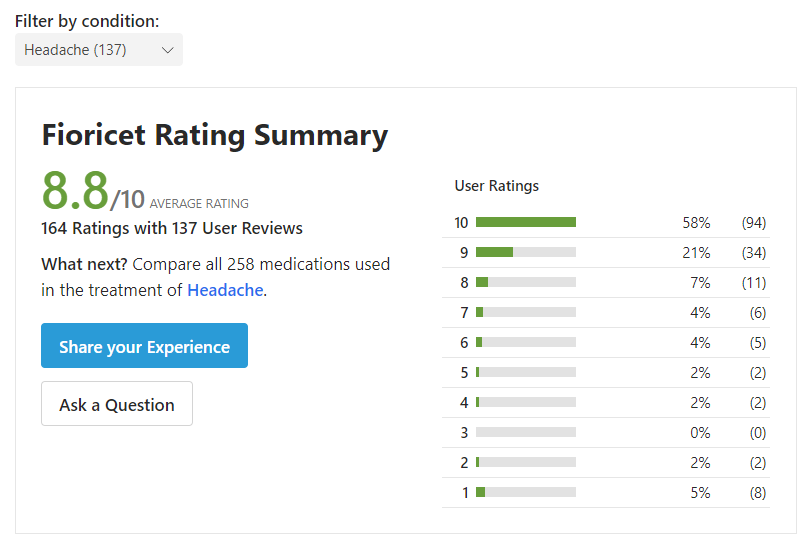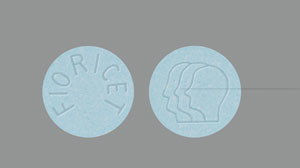If you have seen a doctor, the doctor recommend you to take fioricet for headache relief. It is OK to buy fioricet online.
What is Fioricet?
Fioricet is a combination medication that is used to treat complex tension headaches when other medications have not been effective.
Fioricet is a combination medication used to treat migraines or severe headaches. Learn the uses, effects and how to use Fioricet safely.
-
- Fioricet (butalbital / acetaminophen / caffeine) works better and faster in treating tension headaches than the combination of acetaminophen and codeine.
- Fioricet (butalbital / acetaminophen / caffeine) has a cheaper, generic version.
- Fioricet (butalbital / acetaminophen / caffeine) does not require dosage adjustments if you have kidney and liver problems.
Butalbital is well absorbed from the gastrointestinal tract and is expected to distribute to most tissues in the body. Barbiturates in general may appear in breast milk and readily cross the placental barrier. They are bound to plasma and tissue proteins to a varying degree and binding increases directly as a function of lipid solubility.
Elimination of butalbital is primarily via the kidney (59% to 88% of the dose) as unchanged drug or metabolites. The plasma half-life is about 35 hours. Urinary excretion products include parent drug (about 3.6% of the dose), 5-isobutyl-5-(2,3-dihydroxypropyl) barbituric acid (about 24% of the dose), 5-allyl-5(3-hydroxy-2-methyl-1-propyl) barbituric acid (about 4.8% of the dose), products with the barbituric acid ring hydrolyzed with excretion of urea (about 14% of the dose), as well as unidentified materials. Of the material excreted in the urine, 32% is conjugated.
The in vitro plasma protein binding of butalbital is 45% over the concentration range of 0.5-20 mcg/mL. This falls within the range of plasma protein binding (20%-45%) reported with other barbiturates such as phenobarbital, pentobarbital, and secobarbital sodium. The plasma-to-blood concentration ratio was almost unity, indicating that there is no preferential distribution of butalbital into either plasma or blood cells.
What is Fioricet?
Fioricet is the brand name multi-ingredient medication that’s used to treat some types of headaches. It’s also available in generic form.
Fioricet contains:
-
- butalbital 50mg
- acetaminophen 300mg
- caffeine 40mg
It’s FDA-approved to treat symptoms of a common type of headache known as tension headache but is also prescribed off-label for migraine.
Butalbital APAP Caffeine is used to treat tension headaches. Acetaminophen helps to decrease the pain from the headache. Caffeine helps increase the effects of acetaminophen. Butalbital is a sedative that helps to decrease anxiety and cause sleepiness and relaxation.
Butalbital APAP Caffeine has following side effects: Bloated or “gassy” feeling, dizziness or lightheadedness (mild), drowsiness (mild), nausea, vomiting, or stomach pain (occurring without other symptoms of overdose), Bleeding or crusting sores on lips, chest pain, fever with or without chills, hive-like swellings (large) on eyelids, face, lips, and/or tongue, muscle cramps or pain
Butalbital APAP Caffeine can not be taken for a long time, your body may get used to it so that larger amounts are needed to produce the same effects. This is called tolerance to the medicine. Also, butalbital may become habit-forming (causing mental or physical dependence) when it is used for a long time or in large doses. Physical dependence may lead to withdrawal side effects when you stop taking the medicine. In patients who get headaches, the first symptom of withdrawal may be new (rebound) headaches.
Gabapentin Neurontin is a good medicine for Migraine Prevention.
But you yourself must know what is your main concern when you take fioricet online.
If you have breathing problems, a certain enzyme disorder, liver disease, kidney disease, personal or family history of regular use/abuse of drugs/alcohol, mental/mood disorders, abdominal/stomach problems. You must tell your doctor this kinds of problems because your health condition and medical condition are very important for doctors to decide whether give you Tramadol prescription.
-
- Fioricet is a combination pain-reliever (analgesic) containing acetaminophen, butalbital, and caffeine.
- Experts aren’t sure exactly how acetaminophen works, but suspect it blocks a specific type of cyclo-oxygenase (COX) enzyme, located mainly in the brain.
- Butalbital belongs to the class of medicines called barbiturates. When used for pain due to tension headaches experts believe it works by relaxing muscle contractions and causing sedation via an enhancement of the inhibitory effects of GABA (a neurotransmitter that regulates communication between brain cells).
- Caffeine is thought to enhance the pain-relieving effects of acetaminophen by up to 40%. In addition, it has vasoconstrictive properties, narrowing blood vessels in the brain thereby decreasing blood flow and oxygen tension (before a headache or a migraine, blood vessels tend to enlarge). This also helps to relieve pain.
- Fioricet belongs to the class of medicines known as barbiturates because it contains butalbital. It may also be called a combination analgesic.
What are the Symptoms of a Fioricet Overdose?
While butalbital is the addictive ingredient in Fioricet, acetaminophen is the ingredient which is liable to cause an overdose. Unfortunately, people who misuse Fioricet as a recreational drug or as a way to suppress withdrawal are most likely to suffer an overdose.
When a person overdoses on Fioricet, the acetaminophen will damage their liver. In severe cases, an overdose can even provoke fatal liver failure. For this reason, it is dangerous to take Fioricet together with another medication which contains acetaminophen because it increases the risk of overdose and death. Furthermore, drinking alcohol while taking Fioricet may also inflict liver damage.
A Fioricet overdose is a medical emergency, so it’s important to know the symptoms. An overdose on Fioricet and all other forms of liver failure cause jaundice, the yellowing of the skin and eyes. Other symptoms of an overdose include:
-
-
- Confusion
- Convulsions and seizures
- Fainting
- Irregular heartbeat
- Lack of appetite
- Nausea and vomiting
- Restlessness
- Stomach pain
- Sweating
- Tremors
-







